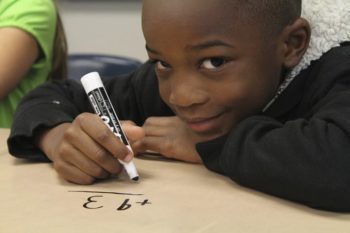5 Things Parents Should Know About Assessments
 1. Tests and Assessments Are Not the Same
1. Tests and Assessments Are Not the Same
A test examines a student’s knowledge, understanding, and skills to determine what level of learning has been reached. It generally results in a numerical or letter grade.
Assessments involves gathering, analyzing, and responding to a student’s strengths and misconceptions about their learning. It includes feedback to the learner and also informs the teacher’s practice.
An analogy would be your BMI that provides a number but not a health analysis or fitness plan. Sometimes we need a test and sometimes learning requires assessment.
2. A Standardized Test Is Just a Snapshot
There’s nothing wrong with getting an annual family portrait to provide a benchmark of growth. But in the classroom, assessment, using a variety of strategies presents a kaleidoscope of your child’s educational skills and abilities. Sometimes it’s okay to weigh yourself twice a year, but in order to monitor gain or loss you want to check your progress more frequently
3. Encourage and Acknowledge Progress
Children can become discouraged when they don’t get the score or rating they expected. So can adults, athletes, and accountants. With assessment it is okay to make mistakes as long as you learn from them. The goal of assessment is improvement and small steps are important in reaching the big picture goals. It’s not about the learning gaps; it’s how we cross over them. “I was taught that the way of progress was neither swift nor easy.” Marie Curie.
4. Let’s Work Together: Stay Connected
All of our lives have ups and downs. If your child is going through a rough patch keep the teacher informed of their changing mindset, unusual setbacks, and setups that support improvement. Follow your child’s progress on your school’s learning management system. Talk with them and their teacher, their assignments/assessments, their progress, and what you can do at home to support your child’s learning.
5. Grades Don’t Mean Everything
Test scores and report cards do not represent the whole child. You know, the one with a wonderful sense of humor, who helps others solve problems. The one who works consistently and diligently may be more successful in life than another who studies 12 hours a day and gets high test scores.
What do you think? What would you? Any lingering questions?
Laura Greenstein, Ed.D., Author, GenParenting.com Guest Blogger, and Founder of the Assessment Network
Edited by Mary Ann Burke, Ed.D.
Copyright (c) 2017 by GenParenting

Laura Greenstein has been an educator for over 30 years serving as a teacher, department chair, and school leader in multiple grades and subjects. She combines this background with her experience as a school board member and professional development specialist to bring fresh and original ideas to educators about teaching, learning, and assessing. She consults with schools and districts and presents at workshops and conferences locally and nationally. As an adjunct professor at the University of Connecticut and the University of New Haven, she teaches Human Development and Assessment to undergraduate and graduate students and more recently, Teaching, Learning, and Assessing with Technology in the 6th year Digital Literacy program. She has a B.S. from the University of Connecticut, an M.S. from the State University of New York at Oneonta in education, a 6th year from Sacred Heart University in administration, and an Ed.D. from Johnson and Wales University in Educational Leadership. Her website, http://www.assessmentnetwork.net, is a valuable source of information on issues and topics in assessment. She is the author of multiple books on assessment including What Teachers Really Need to Know About Formative Assessment, Assessing 21st Century Skills: A Guide to Evaluating Mastery and Authentic Learning, Restorative Assessment: Strength-Based Practices to Support all Learners, and Sticky Assessment: Classroom Strategies to Amplify Student Learning.

